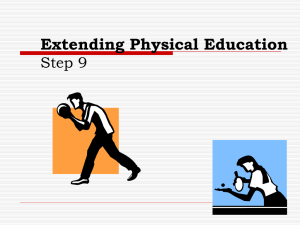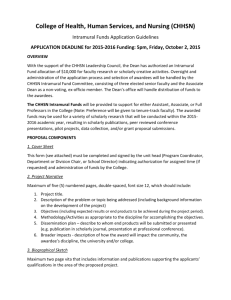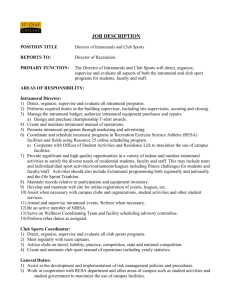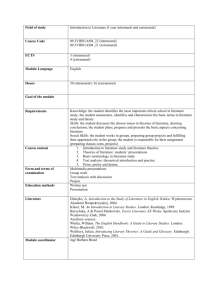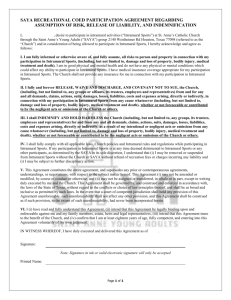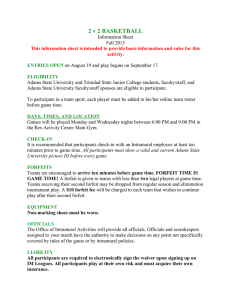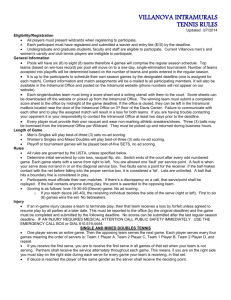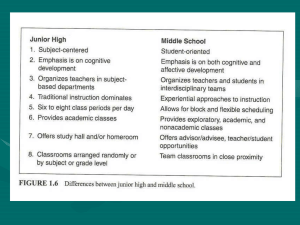T h e
advertisement
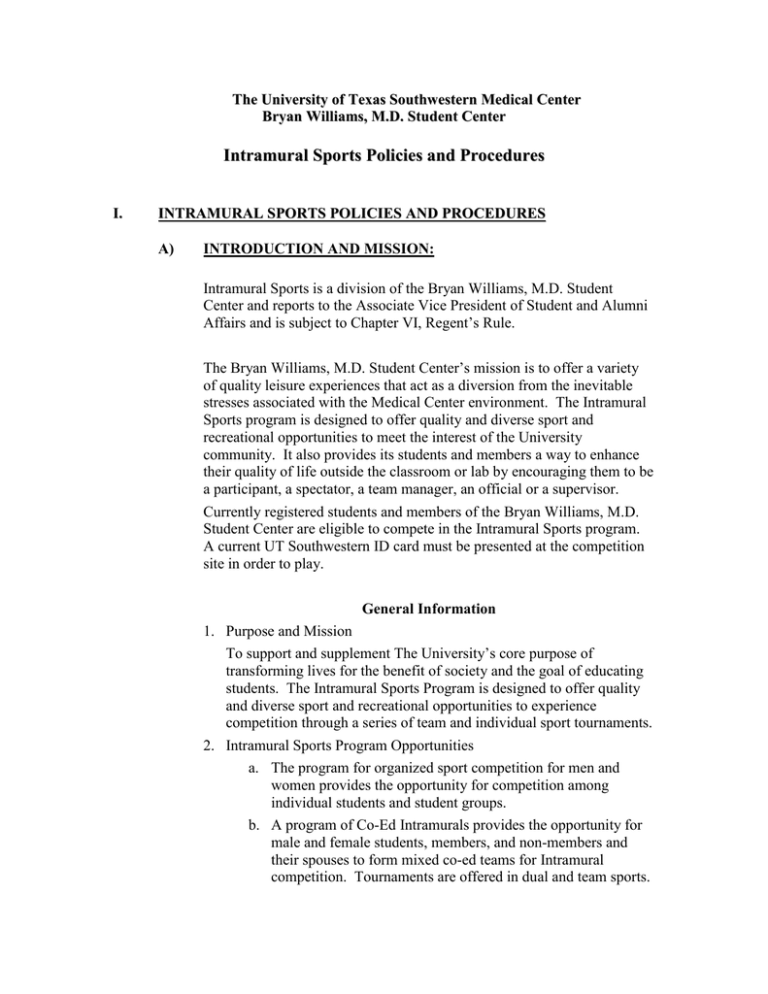
The University of Texas Southwestern Medical Center Bryan Williams, M.D. Student Center Intramural Sports Policies and Procedures I. INTRAMURAL SPORTS POLICIES AND PROCEDURES A) INTRODUCTION AND MISSION: Intramural Sports is a division of the Bryan Williams, M.D. Student Center and reports to the Associate Vice President of Student and Alumni Affairs and is subject to Chapter VI, Regent’s Rule. The Bryan Williams, M.D. Student Center’s mission is to offer a variety of quality leisure experiences that act as a diversion from the inevitable stresses associated with the Medical Center environment. The Intramural Sports program is designed to offer quality and diverse sport and recreational opportunities to meet the interest of the University community. It also provides its students and members a way to enhance their quality of life outside the classroom or lab by encouraging them to be a participant, a spectator, a team manager, an official or a supervisor. Currently registered students and members of the Bryan Williams, M.D. Student Center are eligible to compete in the Intramural Sports program. A current UT Southwestern ID card must be presented at the competition site in order to play. General Information 1. Purpose and Mission To support and supplement The University’s core purpose of transforming lives for the benefit of society and the goal of educating students. The Intramural Sports Program is designed to offer quality and diverse sport and recreational opportunities to experience competition through a series of team and individual sport tournaments. 2. Intramural Sports Program Opportunities a. The program for organized sport competition for men and women provides the opportunity for competition among individual students and student groups. b. A program of Co-Ed Intramurals provides the opportunity for male and female students, members, and non-members and their spouses to form mixed co-ed teams for Intramural competition. Tournaments are offered in dual and team sports. c. The purpose of these programs is to provide the opportunity for wholesome sport competition among students, faculty, staff and residents and to foster the physical, social, and emotional benefits accompanied by a sense of sportsmanship in athletic activities. 3. Intramural Sports Council The Intramural Sports Council works closely with the Activities Coordinator to develop relevant policies, rules, and activities for the University’s Intramural Sports Programs, including Medical School College Cup programming. Regulations for All Intramural Sports Honor Code 1. All individuals and organizations participating in Intramural Sports shall be expected to comply with the spirit as well as the letter of the rules. 2. Charges of alleged violations of the Honor Code shall be submitted to the Intramural Coordinator. 3. The burden of proving each allegation rests with the individual or group making the charge and all evidence must be presented in writing to the Director or her delegate. If an alleged violator is found guilty, the Intramural Coordinator will determine a penalty. 4. The Intramural staff reserves the right to move a “social team” or individual up to a “competitive” bracket if it is determined that the team or individual is of higher caliber than the “B” status. 5. Abuse of Intramural officials, in any form, will not be tolerated. All violations of this code will be reviewed by the Intramural Coordinator and may result in individual or team suspension or referral to the Associate Vice President of Student and Alumni Affairs. 6. Fighting in any form will result in the suspension of the participant (s) and a hearing before the Intramural Coordinator. 7. Ignorance of the rules is no excuse for any violations that occur. B) ELIGIBILITY: Participants must be students of the University of Texas Southwestern Medical Center OR members of the Bryan Williams, M.D. Student Center. 1. Players may play for only one (1) team per division. Players may only play in one division, unless one of the teams is a Men’s/Women’s team and one of the teams is Co-Rec. C) 2. Players must be listed on the original roster that is filed in the Student Center office. Rosters and must be kept up to date and accurate! Each player must complete a liability waiver to be eligible to participate. 3. Participants must have their school I.D.'s with them while they are participating in intramural events, including off campus events. 4. No non-students or non-members will be permitted to play Intramural Sports. Using ineligible players will result in the removal from league play. TEAM MANAGER’S RESPONSIBILITY: 1. Team managers shall be responsible for knowing all policies and procedures published herein, printed on Intramural entries, notices or flyers, etc., and information covered in the team managers’ meeting. 2. The team manager is responsible for seeing that full names of all contestants appear on the team rosters and scorecards. Any person’s name appearing on the scorecard will be counted as a participant in that contest. Team captains or managers should sign each scorecard to attest to accuracy. 3. Team managers should be familiar with the sportsmanship policy herein and should be aware that poor sportsmanship will jeopardize their team’s future participation. 4. Attendance at team manager’s meetings will be compulsory for each organization’s team manager or his or her representative. Failure to attend may result in the loss of the privilege to appeal any situation dealing with the information discussed at this meeting. 5. Team managers are responsible for maintaining contact with the Bryan Williams, M.D. Student Center in regard to schedules, entries, playoffs, rainout schedules, etc. Schedule information will not be given out over the telephone. The Coordinator of Campus Activities will only make exceptions. D) SPORTSMANSHIP POLICY: In order to promote good sportsmanship the Intramural Sports Program has adopted a sportsmanship policy. In addition to the honor code, this sportsmanship policy will be strictly enforced by the Intramural staff. It is the responsibility of each player to do everything possible to make certain that the game atmosphere is friendly and fun. 1. No player, coach, or team follower shall: a. Use foul or derogatory language, threaten, or verbally abuse any other participant, Intramural employee, or spectator before, during or after the game; b. Participate in a game for which he/she is ineligible; c. Argue or talk back to the game official(s); d. Intentionally strike, push, trip or otherwise physically assault or fight with another player, spectator, official, or staff member; or e. Mistreat the facility, equipment or supplies of The University of Texas Southwestern Medical Center. 2. Warning and Ejection A warning and ejection system will be used to enforce the sportsmanship policy. Individuals or teams will be issued a warning as explained below. Two warnings will result in an ejection of an individual or the forfeiture of a game. EJECTIONS CAN BE ISSUED WITHOUT ANY WARNINGS! Sport Specific Examples: Softball (1) Verbal admonishment = warning (2) Second verbal warning or first severe act = ejection (3) Three ejections on one team = forfeit Basketball (1) Technical foul = warning (2 free throws and the ball to opposing team mid-court opposite scorer’s table). Count toward personal and team foul count (2) Second technical foul = ejection (3) Third technical foul on one team = forfeit of the game 3. Ejection a. Any player, coach, or team follower receiving an ejection must meet with the Intramural Coordinator before participating in the next Intramural contest. Penalties for b. c. d. e. 4. ejection include suspension and/or probation for a period of one game up to an entire academic year or life. A player may submit an appeal for his or her suspension. However, that player may not participate in any Intramural contest while the appeal is in process. Team captains are responsible for the conduct of their players, sidelines, and spectators. Team captains who cannot fulfill this responsibility will be issued a warning and a subsequent ejection if necessary. In the case of extreme misconduct, teams and or individuals will be referred to the Associate Vice President of Student and Alumni Affairs. If a team is scheduled in a double header, any ejected player may NOT participate in any tournament games scheduled the same day until meeting with the Intramural Coordinator. Ejected players must leave the court of field following ejection. Fighting Fighting is defined as a participant intentionally striking, pushing, slapping, punching, elbowing, tackling, or committing any other malicious act toward any other person. Fighting is never permitted in Intramural contests. Participants who fight will be ejected immediately and suspended from all further participation until the outcome of a disciplinary action meeting with the Intramural Coordinator. 5. Major and Minor Penalties a. Any suspension barring an individual or team from Intramural participation for less than eight weeks shall be defined as a minor penalty. Minor penalties may be appealed to the Intramural Sports Council where all decisions will be final. b. Any suspensions from Intramural play for a period longer than eight weeks shall be defined as a major penalty. Major penalties imposed by the Intramural Coordinator may be appealed to the Director of Recreational Sports following the appeal procedure. 6. Sportsmanship Ratings a. Ratings are given to teams after each contest by supervisors and officials. These ratings reflect behavior before, during, and after the contest. b. c. In order for a team to qualify for post season playoffs, it must have a "B" average in sportsmanship during regular season round robin play as judged by the game officials. Sportsmanship ratings will be based on the following criteria: 1. A = Excellent conduct and sportsmanship. Players cooperate with officials and team members. The captain calmly converses with officials and has full control of his/her team. 2. B = Good conduct and sportsmanship. Team members verbally complain about officials and show minor dissension, which may or may not merit a warning. Teams that receive one warning will receive no higher than a B rating. 3. C = Average conduct and sportsmanship. Team shows verbal dissent towards officials or opposing team, which may or may not merit a warning. Captain exhibits minor control over his/her team. Teams receiving multiple warnings or one ejection will receive no higher than a C rating. 4. D = Below average conduct and sportsmanship. Team constantly dissents the officials’ calls or directs trash talk to officials or opposing team. Team captain has little control over his/her team or self. A team receiving three or more warnings or two ejections will receive no higher than a D rating. 5. F = Poor conduct and sportsmanship. Team is completely uncooperative. Captain has no control over self or the team. Examples of behavior warranting an F rating are as follows: (i) Any game forfeited for fighting or other abusive and violent behavior. (ii) A team has been warned about unnecessary roughness that jeopardizes the participants. (iii) A player or spectator clearly associated with a team shouts obscenities, gestures, or commits other threatening actions, which could endanger any official, supervisor or program assistant. (iv) Any game where the following occur: three ejections in softball, 3 technical fouls in basketball, 3 red cards in volleyball, ect. (v) When any situations as in (iv) occur, the game shall end. Any team receiving an F rating during the regular season will be declared ineligible for post-season tournament play. These teams have the option of appealing their eligibility to the Intramural Coordinator. 7. Special Contest Situations: a. A team winning by default will receive an A rating. b. SPECIAL SPORTSMANSHIP POLICIES EXIST IN THE PLAYOFFS. Teams must receive a C or higher rating in order to continue. Other conditions will be posted with the brackets. c. Teams must receive a C or higher rating. Any team rated D or F will be removed from the tournament. Teams have until 12 noon the next day, or one hour prior to the next contest whichever comes first - to appeal the rating to the Intramural Coordinator. 8. Assumed Names The use of an assumed name in any manner in the Intramural Program shall constitute a violation. Should a player use an assumed name or be guilty of a fraudulent act, he or she shall be disqualified from participating in Intramurals for a period of up to one year. In addition, the team using such a player shall be disqualified from that sport pending a hearing with the Intramural Sports Coordinator. E) POSTPONEMENTS/SCHEDULES: 1. All games or matches will be played at the scheduled time unless major problems are present. 2. TEAMS SHOULD ANTICIPATE HAVING A PLAYER (OR PLAYERS) NOT AVAILABLE FOR A GAME (OR GAMES) BECAUSE OF CLASS CONFLICTS AND OTHER ACTIVITIES AND HAVE AN AMPLE NUMBER OF PLAYERS ON THEIR ROSTERS. 3. The Student Center office is willing to cooperate in extraordinary circumstances by allowing an occasional postponement. However, due to the amount of teams entered, the comparatively short playing season, and the limited playing facilities, these must be kept to a minimum. If rescheduling is necessary, a scheduled contest may be postponed only with the consent of both team captains and the Intramural Coordinator. 4. A request for rescheduling must be made by 4:00 p.m. the day prior to the game in question. Teams that postpone games or agree to forfeiture without securing the consent of the Intramural Coordinator are liable to a penalty or forfeit as well as payment for the game official and field supervisor. F) PROTESTS: 1. Only the Captain can protest if they feel that there was improper interpretation or enforcement of the rules. 2. THE NOTIFICATION OF INTENT TO PROTEST MUST BE MADE IMMEDIATELY BEFORE THE NEXT PLAY. It must be made upon the field of play and duly noted by the official. The protesting team must make sure that the exact score, inning, team at bat, runners and the bases that they occupied and other particulars of the play are noted by the official and supervisor in charge before resuming play. Both teams and the official must be told that the game is being played under protest. a. PROTESTS SHALL NOT BE CONSIDERED IF THEY ARE BASED SOLELY ON A DECISION INVOLVING THE ACCURACY OF JUDGMENT ON THE PART OF AN UMPIRE OR FIELD SUPERVISOR. Examples of protest, which will not be considered, is: 1. 2. 3. 4. 5. 6. 7. 8. 9. 10. 11. 12. 13. Whether a batted ball was foul or fair. Whether a base runner is safe or out. Whether a pitched ball was a strike or a ball. Whether a pitch was legal or illegal. Whether a base runner did or did not touch a base. Whether a base runner left base too soon on a caught fly ball. Whether a fly ball was or was not caught legally. Whether it was or was not an infield fly. Whether a player traveled. Whether a player was fouled or not. Whether a ball was out of bounds or in. Whether a player batted the ball. Any other matter involving only the accuracy of the umpire's judgment. b. PROTESTS THAT SHALL BE CONSIDERED, CONCERN MATTERS OF THE FOLLOWING TYPES: 1. 2. 3. G) Misinterpretation of a playing rule. Failure of an umpire to apply the correct rule to a given situation. Failure to impose the correct penalty for a given violation. 3. Any team protesting the eligibility of any player must furnish evidence that the player is, in fact, ineligible within 24 hours of the contest in question. 4. After receipt of the initial written protest and documentation of evidence, the Intramural Coordinator will further investigate the complaint and make a decision. An upheld protest involving rule interpretation will result in the game in question being replayed from the point of protest. Upheld player eligibility protests will result in a forfeit of the game in which the ineligible player competed. 5. The Student Center staff may investigate any alleged violation of any intramural sport policy without the filing of protest by a participant. DISCIPLINARY STATEMENT: 1. In the event an individual(s), and/or spectator(s) conducts him/herself in an unsportsmanlike manner during intramural sport competition, the official(s)and/or the field supervisor of the game has complete authority in taking action, as they deem it necessary, to keep the game in control. Depending on the severity of the incident, which would be left up to the official's judgment, the official may take the following action: give warnings, ejection from the game, ejection from area, and/or suspend the game. All but warnings will be reported to the Student Center staff for further action. 2. Incidents reports to the Student Center staff which indicate unsportsmanlike conduct (examples: using an ineligible player(s); theft of or damage to facilities or equipment; physical and/or verbal abuse toward official(s), supervisor(s), player(s), or spectator(s), etc.) will be investigated by the Student Center staff. In doing so, the individual(s) and/or team(s) involved will be questioned and required to submit a written statement of the incident by 9:00 a.m. on the day following the incident. Written statements from the officials and supervisors on duty will also be obtained. At the conclusion of the investigation, the Student Activities staff will rule on the individual(s) and/or team(s) involved. Penalties could include suspension from a game, games or season; temporary or permanent probation; and/or suspension from intramural sports for a given time period. Physical contact with a Student Center employee, official or participant automatically brings at least a one-year suspension from intramural sports participation. 3. Any individual who is found guilty of cheating may be disqualified from all intramural sports for the balance of his/her university career or any part thereof. If the team, which he/she represents, is a party to his/her cheating, that team may be barred from intramural sports for the balance of the year or any part thereof. Some of the infractions, which come under this heading, are: a. b. c. 4. H) Playing under an assumed name. Playing on more than one team within the same league (social or competitive). Misrepresenting a score. Only action relating to intramural sports will be taken. Any incident judged to be of serious concern would be referred to the Associate Vice President of Student and Alumni Affairs. APPEALS: 1. The appeal process exists to insure that all rulings or disciplinary actions taken against Intramural teams or individuals are equitable. The person/council/committee to which a decision is appealed will review the previous decision and rule on its appropriateness given the infraction(s) or circumstances surrounding the specific case. With any appeal, the person/council/committee may decide to lessen the penalty, uphold the previous decision, or increase the penalty levied by the staff or council. 2. Appeals of Decisions by the Intramural Supervisor a. 3. Individuals or teams wishing to appeal a decision by an Intramural Supervisor on site shall have until 9:00 AM the following day to notify the Intramural Coordinator in writing of their appeal. All relevant reasons and circumstances should be noted in the appeal. A decision will be made in the next 24 hours. Appeals of Decisions by the Intramural Coordinator Certain cases will be referred directly to the Director of the Bryan Williams, M.D. Student Center. a. b. 4. Should a team wish to appeal a decision by the Intramural Coordinator, a written statement must be turned in within 24 hours to the Director of the Bryan Williams M.D. Student Center, stating the facts surrounding the appeal. A hearing will be scheduled before Director. Upon hearing the case, he/she will uphold, reject, or modify the Coordinator’s decision. Appeals of Decisions by the Director a. Decisions by Director of the Bryan Williams, M.D. Student Center involving major penalties may be appealed to the Associate Vice President of Student and Alumni Affairs by submitting, in writing, a letter stating the intent to appeal within 24 hours. The letter should be addressed to the Director of Campus Activities. b. All decisions made by the Associate Vice President of Student and Alumni Affairs are final. I) FORFEITS: 1. All contests shall be played on the date and hour as scheduled. A team not ready to play within a period of five minutes after the scheduled time will be charged with a forfeit, subject to the discretion of the officials, supervisor, and/or Student Center staff. "READY TO PLAY" means that a team must be on the playing field with at least the number of players required to constitute a team and have all players I.D.'s checked. Games lost by forfeit will not be rescheduled for any reason. a. If a team leaves before an official or supervisor duly notes the forfeit, then both teams will be credited with a forfeit. b. J) The team that is present at a forfeit must have a minimum complement of players allowed or both teams will be given a forfeit. 2. In the event both teams and the Student Center staff have agreed to play the game after the scheduled starting time has elapsed, no protest, which is based on the starting time of the game, will be considered. 3. One forfeit will result in the team being dropped from postseason competition. 4. Two forfeits will result in the team being dropped from further competition during league play. 5. In the event a team captain does not obtain his/her game schedule prior to the first game, a forfeit could result. 6. Teams are subject to relevant fees associated with forfeits. See the Forfeit Policies for specific fee rates. MEDICAL EXAMINATION: 1. Everyone is urged to obtain a physical examination before participating in the intramural sports program. 2. Each person is responsible for knowing their own physiological limitations and is responsible for their participation in the program. 3. The Student Center office has no insurance program for its participants. All students at UT Southwestern are required to carry insurance. 4. Neither The University of Texas Southwestern Medical Center nor the Student Center can assume legal nor financial obligation for its participants, as participation in the intramural sports program is strictly voluntary. Any accidents incurred in transit to an event, watching, or playing during an event, or returning to place of residence after an event, is the individual’s responsibility. 5. All injuries sustained in intramural sports play must be reported to the Intramural coordinator and/or supervisor on duty. GOOD LUCK TO YOUR TEAM!! The Student Center staff hopes you enjoy your participation!
